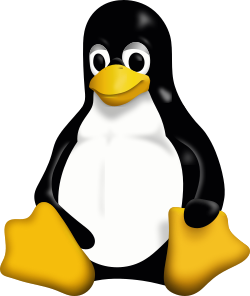 Tux, the mascot of Linux | |
 A screenshot of Debian, one of the oldest Linux distributions | |
| Written in | C, Assembly language, C++, etc. |
|---|---|
| Source model | Open-source |
| Initial release | September 17, 1991 |
| Platforms | PowerPC, ARM, x86, x64, IA_64, Raspberry Pi, PlayStation, PlayStation 2, PlayStation 3, PlayStation 4, Nintendo 64, Nintendo GameCube, Wii, Wii U, Nintendo Switch, Nintendo DS, PlayStation Portable, Nintendo 3DS, PlayStation Vita, Xbox, Xbox 360, Android, iOS, iPadOS |
| Userland | GNU |
Linux, also controversially known as GNU/Linux is a family of open-source Unix-like operating systems originally developed by Linus Torvalds under the Linux kernel released on September 17, 1991. Linux is typically packaged under a distribution.
Distributions include the Linux kernel and supported libraries, many provided by the GNU project. Many distributions include just "Linux" in their names but the Free Software Foundation promotes GNU/Linux to emphasize the importance of GNU in the kernel, causing some controversy.
Linux was originally developed for personal computers based of the 32-bit i386 processor, but has since been ported to more platforms and hardware than any other operating system even beating UNIX and Microsoft Windows. Due to the extremely large user base of Android, Linux is the most used general-purpose operating system of all time. Despite being installed on 2.3% of all personal computers, the Chromebook dominates the public school market. Linux also runs on over 96% of web servers on the Internet. Linux is the only operating system to run the TOP500 supercomputers.
Linux can run on embedded computers such as smart fridges, smart televisions (Samsung and LG uses Tizen and WebOS respectively), Wi-Fi routers, cameras, video game consoles, smart watches.